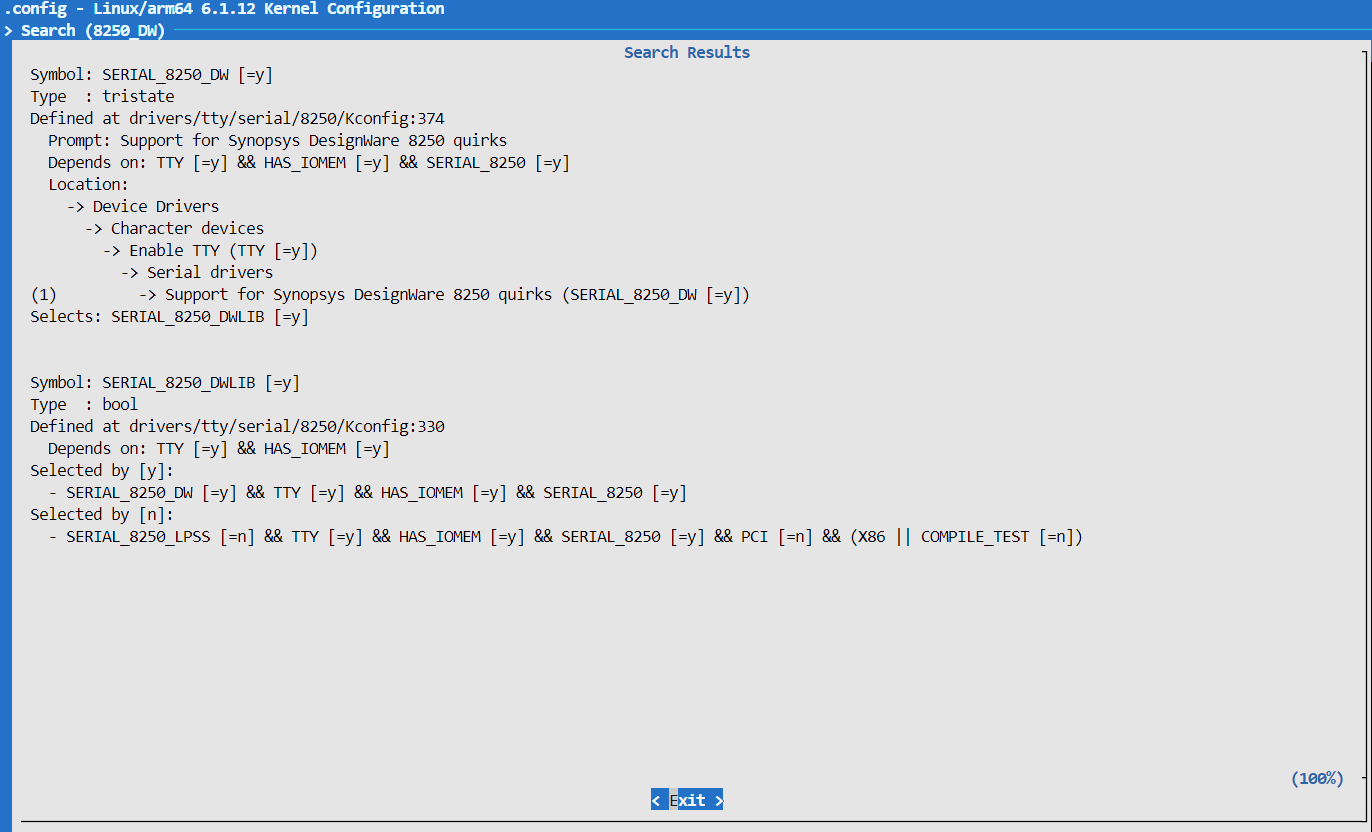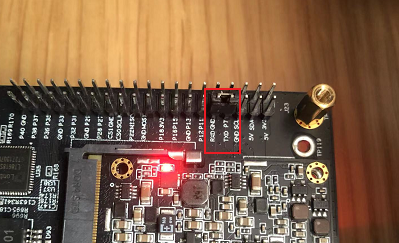UART Driver Debugging Guide
The X3 chip has 4 UART ports: UART0, UART1, UART2, UART3
- UART0 is used as the debugging port, only UART1 supports hardware flow control
- Supports baud rates of 115.2Kbps, 230.4Kbps, 460.8Kbps, 921.6Kbps, 1.5Mbps, 2Mbps, 4Mbps. Enabling TOI is required for speeds above 2M.
- Supports interrupt-based or DMA-based mode
Driver Code
Code Path
drivers/tty/serial/hobot_serial.c
drivers/tty/serial/hobot_serial.h
Kernel Configuration
CONFIG_SERIAL_HOBOT_UART
SERIAL_HOBOT_UART_CONSOLE

DTS Device Node Configuration
The general configuration for uart0-3 can be found in the hobot-xj3.dtsi file. This file is usually not modified. When enabling the corresponding UART, customization and additions can be made in the device tree of the specific board. For example, to enable uart0, 1, and 3 in the hobot-x3-sdb.dts file:
/* arch/arm64/boot/dts/hobot/hobot-xj3.dtsi */
uart0: serial@0xA5000000 {
compatible = "hobot,hobot-uart";
reg = <0 0xA5000000 0 0x1000>;
interrupt-parent = <&gic>;
interrupts = <0 29 4>;
clocks = <&uart0_mclk>;
pinctrl-names = "default";
pinctrl-0 = <&uart0_func>;
status = "disabled";
};
/* arch/arm64/boot/dts/hobot/hobot-x3-sdb.dts */
&uart0 {
``` status = "okay";
};
&uart1 {
status = "okay"; /* 4 wire uart for bt */
pinctrl-0 = <&uart1_func_rtscts>; /* <&uart1_func>; uart 1 connect to bt with rtscts*/
};
&uart3 {
status = "okay"; /* 4 wire uart for bt */
};
UART Testing
Physically connect the TX and RX pins of uart3 on the hardware.

Compile the uart_duplex.c code as follows, with the full code provided in Appendix A:
/opt/gcc-ubuntu-9.3.0-2020.03-x86_64-aarch64-linux-gnu/bin/aarch64-linux-gnu-gcc -o uart_duplex uart_duplex.c -lpthread
Loopback test command: Open /dev/ttyS3 with a default baud rate of 4Mbps, and for each round of testing, transmit and receive 1MB of data by default over 100 rounds. Concurrently read and write, perform data verification after every transmission and reception of 512 bytes. Upon the completion of a full round of testing without errors, print "Verification Correct".
# ./uart_duplex -c 100 -d /dev/ttyS3
test size:1024 Kbytes, baud:4000000
Start receive thread
Start send thread
Start recv_check thread
This is receive test 1 times
This is uart send 1 times
receive sum:102416 bytes
receive sum:205312 bytes
...
receive sum:924164 bytes
receive sum:1027076 bytes
send 1024Kbytes,time:2700.000000ms, BPS:379259.250000
This is receive test 2 times
## Check the received data is correct ##
The uart_duplex command is used to test the UART functionality. For more usage instructions, refer to its help information.
Appendix (Test Code)
#include <stdio.h>
#include <stdint.h>
#include <stdlib.h>
#include <unistd.h>
#include <fcntl.h>
#include <termios.h>
#include <errno.h>
#include <string.h>
#include <getopt.h>
#include <sys/time.h>
#include <pthread.h>
#include <semaphore.h>
#include <stdlib.h>
#define BUFF_SIZE (20 * 1024 * 1024)
pthread_t recv_thread_id;
pthread_t recv_check_thread_id;
pthread_t send_thread_id;
char send_buffer[BUFF_SIZE] = {0};
char recv_buffer[BUFF_SIZE] = {0};
static uint32_t test_size = 1024;
static uint32_t baud = 4000000;
static uint32_t test_count = 0;
int g_fd;
uint64_t recv_total = 0;
sem_t sem_check;
#define FRAME_LEN 512
#if 1
static void dump_recv_data(uint32_t sum, uint32_t len)
{
int ii = 0;
printf("dump receive data:\n");
for (ii = 0; ii < len; ii += 4) {
printf("0x%x: 0x%x, 0x%x, 0x%x, 0x%x\n", sum + ii,
recv_buffer[sum + ii],
recv_buffer[sum + ii + 1],
recv_buffer[sum + ii + 2],
recv_buffer[sum + ii + 3]);
}
}
static void dump_send_data(uint32_t sum, uint32_t len)
{
int ii = 0;
printf("dump send data:\n");
for (ii = 0; ii < len; ii += 4) {
printf("0x%x: 0x%x, 0x%x, 0x%x, 0x%x\n", sum + ii,
send_buffer[sum + ii],
send_buffer[sum + ii + 1],
send_buffer[sum + ii + 2],
send_buffer[sum + ii + 3]);
}
}
#endif
static void set_baudrate(int fd, int nSpeed)
{
struct termios newtio;
tcgetattr(fd, &newtio);
switch (nSpeed) {
case 2400:
cfsetispeed(&newtio, B2400);
cfsetospeed(&newtio, B2400);
break;
case 4800:
cfsetispeed(&newtio, B4800);
cfsetospeed(&newtio, B4800);
break;
case 9600:
cfsetispeed(&newtio, B9600);
cfsetospeed(&newtio, B9600);
break;
case 19200:
cfsetispeed(&newtio, B19200);
cfsetospeed(&newtio, B19200);
break;
case 38400:
cfsetispeed(&newtio, B38400);
cfsetospeed(&newtio, B38400);
break;
case 57600:
cfsetispeed(&newtio, B57600);
cfsetospeed(&newtio, B57600);
break;
case 115200:
cfsetispeed(&newtio, B115200);
cfsetospeed(&newtio, B115200);
break;
case 230400:
cfsetispeed(&newtio, B230400);
cfsetospeed(&newtio, B230400);
break;
case 921600:
cfsetispeed(&newtio, B921600);
cfsetospeed(&newtio, B921600);
break;
case 1000000:
cfsetispeed(&newtio, B1000000);
cfsetospeed(&newtio, B1000000);
break;
case 1152000:
cfsetispeed(&newtio, B1152000);
cfsetospeed(&newtio, B1152000);
break;
case 1500000:
cfsetispeed(&newtio, B1500000);
cfsetospeed(&newtio, B1500000);
break;
case 2000000:
cfsetispeed(&newtio, B2000000);
cfsetospeed(&newtio, B2000000);
break;
case 2500000:
cfsetispeed(&newtio, B2500000);
cfsetospeed(&newtio, B2500000);
break;
case 3000000:
cfsetispeed(&newtio, B3000000);
cfsetospeed(&newtio, B3000000);
break;
case 3500000:
cfsetispeed(&newtio, B3500000);
cfsetospeed(&newtio, B3500000);
break;
case 4000000:
cfsetispeed(&newtio, B4000000);
cfsetospeed(&newtio, B4000000);
break;
default:
printf("\tSorry, Unsupported baud rate, use previous baudrate!\n\n");
break;
}
tcsetattr(fd,TCSANOW,&newtio);
}
static void set_termios(int fd)
{
struct termios term;
tcgetattr(fd, &term);
term.c_cflag &= ~(CSIZE | CSTOPB | PARENB | INPCK);
term.c_cflag |= (CS8 | CLOCAL | CREAD);
term.c_lflag &= ~(ICANON | ECHO | ECHOE | ISIG);
term.c_oflag &= ~(OPOST | ONLCR | OCRNL);
term.c_iflag &= ~(ICRNL |INLCR | IXON | IXOFF | IXANY);
term.c_cc[VTIME] = 0;
term.c_cc[VMIN] = 1;
tcsetattr(fd, TCSAFLUSH, &term);
}
static void *send_test(void *times)
{
/*send thread*/
struct timeval start, end;
int32_t i = 0;
uint32_t j = 0;
uint32_t tmp = 0;
uint32_t exe_count = 0;
int32_t ret = 0;
float ts = 0;
printf("Start send thread\n");
sleep(1);
if (test_count == 0) {
tmp = 10;
} else
tmp = test_count;
for (j = 0; j < tmp; j++) {
if (test_count == 0)
j = 0;
sleep(1);
printf("This is uart send %d times\n", ++exe_count);
gettimeofday(&start, NULL);
for (i = 0; i < test_size * 1024; i = i + FRAME_LEN) {
ret = write(g_fd, &send_buffer[i], FRAME_LEN);
if (ret < FRAME_LEN) {
printf("write ttyS2 error\n");
return NULL;
}
}
#if 1
gettimeofday(&end, NULL);
// printf("start %ld sec, %ld usec, end %ld sec, %ld usec\n", start.tv_sec, start.tv_usec, end.tv_sec, end.tv_usec);
ts = ((end.tv_sec * 1000000 + end.tv_usec) - (start.tv_sec * 1000000 + start.tv_usec)) / 1000;
printf("send %dKbytes,time:%fms, BPS:%f\n", test_size, ts, test_size * 1000 / (ts / 1000));
#endif
}
close(g_fd);
return NULL;
}
static void *recv_test(void *times)
{
int32_t j = 0;
uint32_t exe_count = 0;
int tmp = 0;
int size = 0;
int sum = 0;
int last_count = 0;
int len = 0;
int len_frame = 0; /*use to get correct frame len*/
printf("Start receive thread\n");
memset(recv_buffer, 0, sizeof(recv_buffer));
if (test_count == 0) {
tmp = 10;
} else
tmp = test_count;
for (j = 0; j < tmp; j++) {
sum = 0;
last_count = 0;
if (test_count == 0)
j = 0;
printf("This is receive test %d times\n", ++exe_count);
//gettimeofday(&start, NULL);
size = test_size * 1024;
while (size > 0) {
len = read(g_fd, &recv_buffer[sum], FRAME_LEN);
if (len < 0) {
printf("read error\n");
return NULL;
}
recv_total += len;
len_frame += len;
if (len_frame >= FRAME_LEN) {
len_frame -= FRAME_LEN;
sem_post(&sem_check);
}
#if 0
ret = memcmp(&recv_buffer[sum], &send_buffer[sum], len);
if (ret != 0) {
printf("data compare error\n");
return NULL;
}
#endif
sum +=len;
size -= len;
if ((sum - last_count) > 100 * 1024) {
printf("receive sum:%d bytes\n", sum);
last_count = sum;
}
}
#if 0
gettimeofday(&end, NULL);
printf("start %ld sec, %ld usec, end %ld sec, %ld usec\n", start.tv_sec, start.tv_usec, end.tv_sec, end.tv_usec);
ts = ((end.tv_sec * 1000000 + end.tv_usec) - (start.tv_sec * 1000000 + start.tv_usec)) / 1000;
printf("receive %dKbytes,time:%fms, BPS:%f\n", test_size, ts, test_size * 1000 / (ts / 1000));
#endif
}
close(g_fd);
return NULL;
}
int32_t error_bit(uint64_t *data1, uint64_t *data2, int32_t len)
{
uint64_t c=0;
int32_t sum = 0;
int i = 0;
for(i = 0; i < len / 8; i++) {
c = data1[i] ^ data2[i];
while(c!=0) {
c &= (c - 1);
sum++;
}
}
return sum;
}
static void *recv_check_test(void *times)
{
int32_t check_pos = 0;
uint32_t *cur_frame = NULL;
int32_t error_bit_cnt = 0;
printf("Start recv_check thread\n");
while (1) {
sem_wait(&sem_check);
/*check data*/
cur_frame = (uint32_t *)&recv_buffer[check_pos];
if (*cur_frame != check_pos / FRAME_LEN) {
printf("error: may lost frame, curruent frame is %d, expected frame is %d position: 0x%x\n",
*cur_frame, check_pos / FRAME_LEN, check_pos);
//dump_recv_data(check_pos, FRAME_LEN);
//dump_send_data(check_pos, FRAME_LEN);
error_bit_cnt = 0;
error_bit_cnt = error_bit((uint64_t *)&recv_buffer[check_pos],
(uint64_t *)&send_buffer[check_pos],
FRAME_LEN / 8);
check_pos += FRAME_LEN;
printf("test total data: 0x%lx, error bit count:%d\n", recv_total, error_bit_cnt);
if (check_pos == test_size * 1024) {
//exit(1);
printf("uart: frame head error\n");
}
continue;
}
error_bit_cnt = 0;
error_bit_cnt = error_bit((uint64_t *)&recv_buffer[check_pos],
(uint64_t *)&send_buffer[check_pos],
FRAME_LEN / 8);
if (error_bit_cnt) {
printf("test total data: 0x%lx!!!!!!!, error bit count:%d\n", recv_total, error_bit_cnt);
//dump_recv_data(check_pos, FRAME_LEN);
//dump_send_data(check_pos, FRAME_LEN);
check_pos += FRAME_LEN;
if (check_pos == test_size * 1024) {
//exit(1);
printf("uart: frame data error\n");
}
continue;
}
memset(&recv_buffer[check_pos], 0, FRAME_LEN);
check_pos += FRAME_LEN;
if (check_pos == test_size * 1024) {
check_pos = 0;
printf("## Check the received data is correct ##\n");
}
}
return NULL;
}
static const char short_options[] = "s:u:c:b:d:h";
static const struct option long_options[] = {
{"size", required_argument, NULL, 's'},
{"baudrate", required_argument, NULL, 'b'},
{"count", required_argument, NULL, 'c'},
{"device", required_argument, NULL, 'd'},
{"help", no_argument, NULL, 'h'},
{0, 0, 0, 0}};
int main(int argc, char *argv[])
{
int ret = 0;
char *pDevice = NULL;
int i = 0;
int32_t cmd_parser_ret = 0;
uint32_t *frame_num = NULL;
uint32_t *frame_value = NULL;
while ((cmd_parser_ret = getopt_long(argc, argv, short_options, long_options, NULL)) != -1) {
switch (cmd_parser_ret) {
case 's':
test_size = atoi(optarg);
break;
case 'b':
baud = atoi(optarg);
break;
case 'c':
test_count = atoi(optarg);
break;
case 'd':
pDevice = optarg;
break;
case 'h':
printf("**********UART STRESS TEST HELP INFORMATION*********\n");
printf(">>> -s/--size [test size,unit--Kbytes,default is 1M, MAX is 20M]\n");
printf(">>> -b/--baudrate [baud,default is 4M]\n");
printf(">>> -c/--count [test count,default is forever]\n");
printf(">>> -d/--uart [uart device, user must set this]\n");
return 0;
}
}
if (baud > 4000000) {
printf("baud is larger than max baud\n");
return -1;
}
g_fd = open(pDevice, O_RDWR | O_NOCTTY);
if (0 > g_fd) {
printf("open fail\n");
return -1;
}
set_baudrate(g_fd, baud);
set_termios(g_fd);
printf("test size:%d Kbytes, baud:%d\n", test_size, baud);
for (i = 0; i < test_size * 1024; i+=4) {
if (i % FRAME_LEN) {
frame_value = (uint32_t *)&send_buffer[i];
*frame_value = rand();
}
}
for (i = 0; i < test_size * 1024 / FRAME_LEN; i++) {
frame_num = (uint32_t *)&send_buffer[i * FRAME_LEN];
*frame_num = i;
// printf("pos:0x%x, value:0x%x\n", i * FRAME_LEN, *frame_num);
}
sem_init(&sem_check, 0, 0);
ret = pthread_create(&recv_thread_id,
NULL,
recv_test,
NULL);
if (ret < 0) {
printf("create uart1 test thread failed\n");
return -1;
}
ret = pthread_create(&send_thread_id,
NULL,
send_test,
NULL);
if (ret < 0) {
printf("create uart2 test thread failed\n");
return -1;
}
ret = pthread_create(&recv_check_thread_id,
NULL,
recv_check_test,
NULL);
if (ret < 0) {
printf("create receive check thread failed\n");
return -1;
}
pthread_join(recv_thread_id, NULL);
pthread_join(recv_check_thread_id, NULL);
pthread_join(send_thread_id, NULL);
return 0;
}